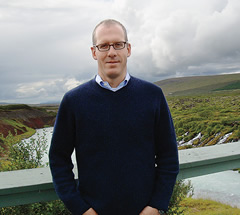After 15 years at U of T as a professor, and more recently as a department chair, Donald Ainslie is embarking on a new role this July as principal of University College. For the 44-year-old philosophy prof, this means a whole new set of challenges – and potential rewards. UC is the oldest and one of the largest colleges in the Faculty of Arts and Science, with 4,000 students and four academic programs. “University College is really the heart of arts and science and thus the heart of the university,” he says. “The principal’s role is to set a strategic direction and ensure that we have the resources necessary to fulfill that direction.”
Ainslie is currently chair of the philosophy department, a position he has held for eight years. As UC principal, he plans to champion small-group learning at the college, and will oversee the September launch of the UC One program, which will offer a special series of seminar courses to first-year students on the theme of “Toronto as urban laboratory.”
As philosophy chair, Ainslie created the Socrates Project, which gives senior undergrads the opportunity to learn philosophy by teaching it to other students. “One of the most rewarding parts of my job has been finding ways to energize students so that they can learn how to think through philosophical problems together,” he says, noting that almost all philosophy classes are now small enough to permit discussions or have tutorials that allow for dialogue, a mode of philosophical learning that dates back to Socrates and Plato.
Ainslie grew up in Toronto, and earned a bachelor of science at Queen’s University in Kingston, Ontario. His major was math – a subject in which “you think about a very narrowly constrained domain with incredible intensity,” he says.
He attended graduate school at the University of Pittsburgh, earning a PhD in philosophy; his dissertation was on David Hume, the 18th-century Scottish empiricist. Before finishing his PhD, however, he took a year off to work in Toronto at McEwan House, a housing program for people with HIV/ AIDS and special needs. “Being with the residents as they were struggling with life-and-death issues taught me about the significance of mortality as a moral issue,” he says.
While working at McEwan House, Ainslie became interested in what philosophers were saying about the AIDS epidemic, and in the ethical questions surrounding health care and our common susceptibility to disease and illness. He ultimately pursued a secondary master’s degree in bioethics, and now teaches a course on it. He says bioethicists tend to focus on questions of what the health professional or the state should do in certain situations, as opposed to “taking seriously what I believe to be the complementary questions of what each of us should do.”
This area of scholarship ties Ainslie to both UC’s Health Studies and Sexual Diversity Studies programs. – With files from Elaine Smith





